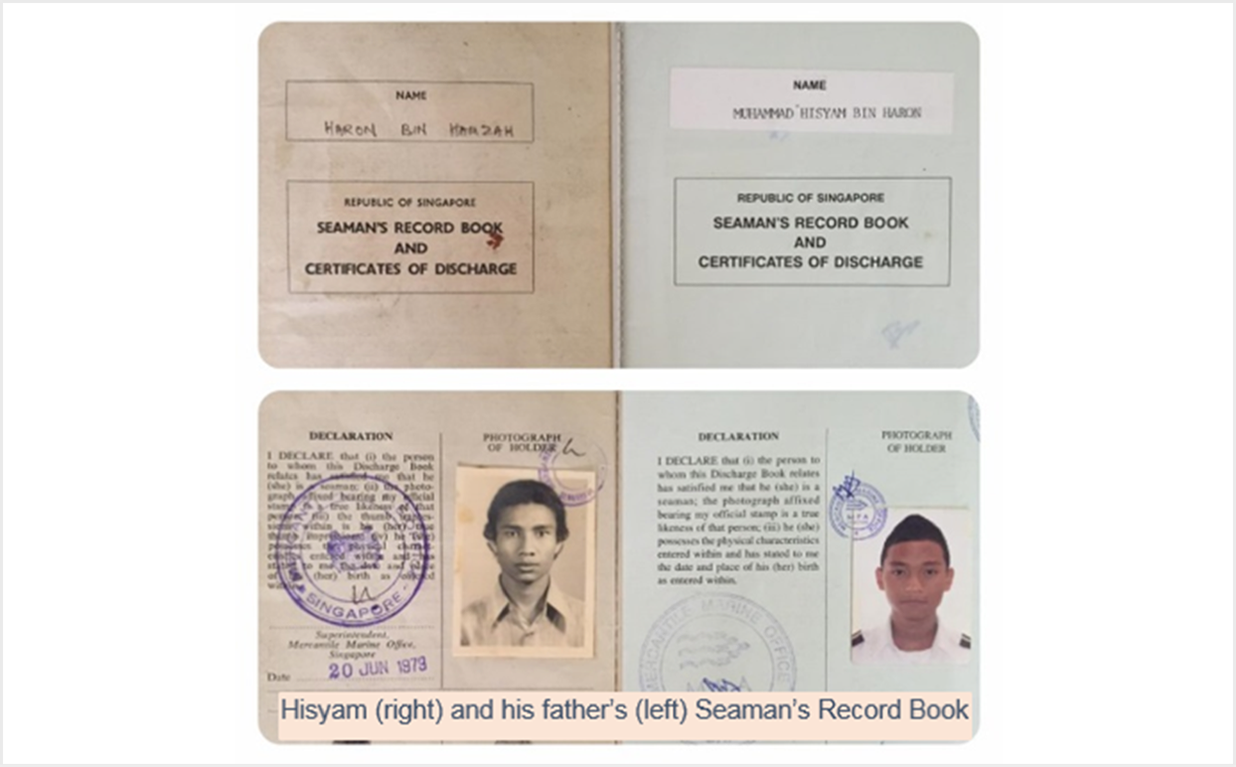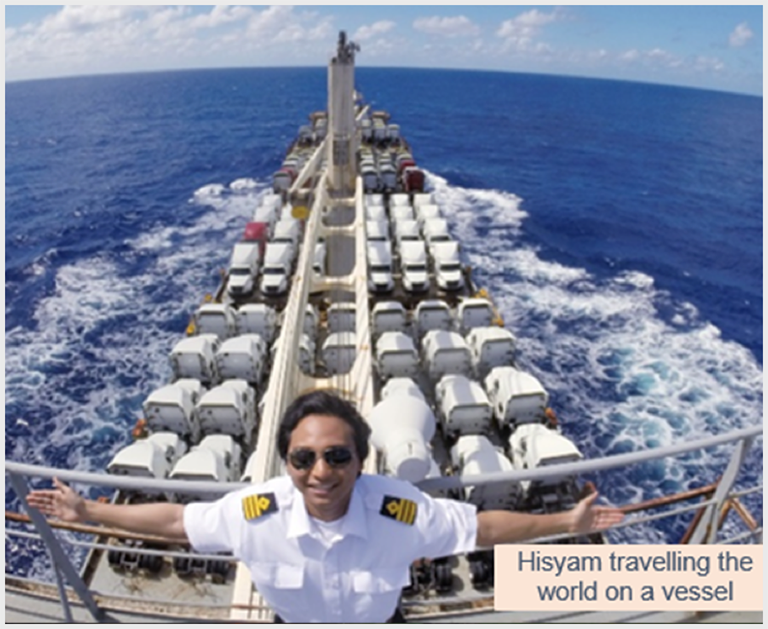This article is brought to you by the Singapore Maritime Foundation. The original article can
be found in Maritime Singapore Connect's website. Link: https:/www.maritimesgconnect.com/
features/profiling-stories/all-roads-lead-rome-try-seven-seas
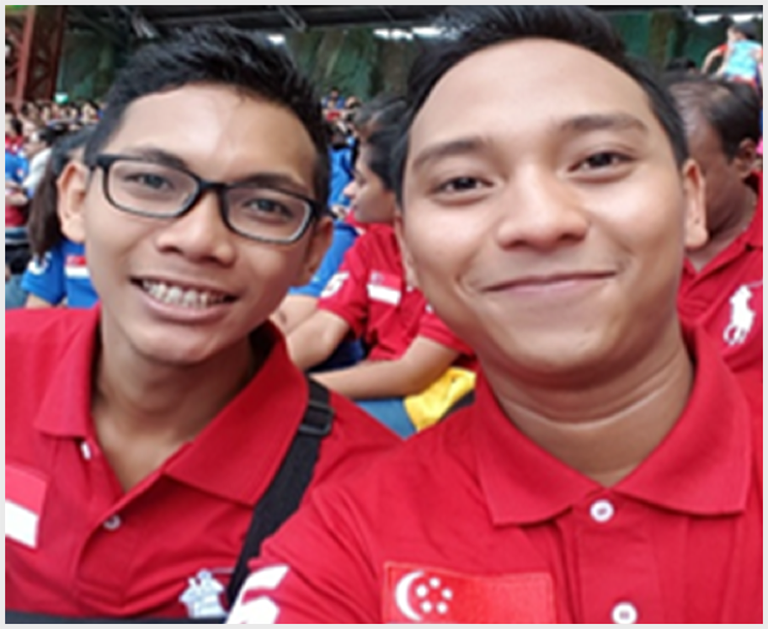 Haziq (left) and Hisyam (right) spending quality time
together when onshore
Haziq (left) and Hisyam (right) spending quality time
together when onshore
They say all road leads to Rome, but as it turns out, many lead someplace else entirely - to
the sea, or the maritime industry for example. It may be an industry shrouded in mystery for
many young graduates, but for those in the know, or the ones curious enough to find out,
they might be surprised to find a multitude of ways to start their journey into the industry.
Meet brothers
Muhammad Haziq Bin Haron , 25 and
Muhammad Hisyam Bin Haron, 28,
one a Marine Engineer and the other a Deck Officer in the maritime industry - two critical
seafaring roles that ensure the smooth operations of a vessel. A graduate of the Higher Nitec
in Marine Engineering from the Institute of Technical Education (ITE) College Central, Haziq
had completed Phase One of the Tripartite Engineering Training Award (TETA) and is sailing as
an Engine Cadet with Pacific International Lines (PIL). Hisyam, Chief Officer at PACC Ship
Managers Pte Ltd, had taken a different route. In 2007, he accepted the SAIL (Seafaring
Alternative An Investment for Life) scholarship for bright 'O' level students and enrolled in
Singapore Polytechnic to pursue a Diploma in Nautical Studies, the only seafaring course
available then. Hisyam has since attained his Certificate of Competency (CoC) Class 1 at the
age of 27, making him one of the youngest qualified male captains in Singapore.
Who/what inspired you to join the maritime sector?
Haziq: Both my brother and father played a large role in influencing my decision to take up
the TETA and join the maritime industry. My father used to sail and I grew up with his exciting
stories of life at sea. As a young child, I had burning questions - How can the big ship stay
afloat on water? How does the ship move? How big is the engine? How can the ship's engine
run for months? What power source does the ship use? These were questions that only the
engine crew could answer. I wanted to know more, and being someone who has always loved
applying practical solutions to problems, it was a natural choice to go for the role of a marine
engineer, one that offered me plenty of hands-on experience in keeping the ship afloat.
Hisyam: My father was my source of inspiration. From him, I learnt that even though work
might be tough at times and dealing with a crew from vastly different backgrounds might hold
its fair share of challenges, at the end of the day, everyone gathers around to have a good
meal together. The strong sense of camaraderie builds positive character and the challenges
on board offer many opportunities to toughen up physically and mentally.
Your jobs require you to spend months out at sea. How did your family react to both of
your decisions to sail?
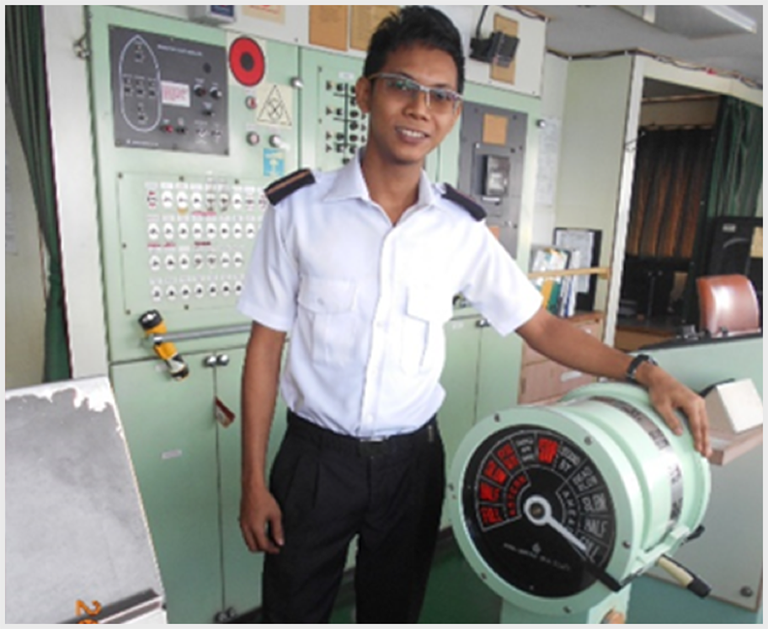 Haziq on navigational bridge learning the deck
aspects of the ship during his cadetship
Haziq on navigational bridge learning the deck
aspects of the ship during his cadetship
Haziq: My family has been very supportive. My father was happy for us to continue his dream,
while my mother, like most mothers do, initially worried and was reluctant for both her sons
to be away. Nonetheless, she has been very supportive. My sisters have also never stopped
showing love and care.
Hisyam: My father being an ex-seafarer himself, was more open to the idea of his sons setting
sail around the world. He understands that it is a challenging but rewarding career, one which
could mould us into a better person with a global mindset. As my brother mentioned, my
mother was quite reluctant at first. She was eventually won over by my perseverance and
after witnessing my hard work come to fruition. Coming from a humble family, the allowance
benefits of the scholarship also helped in lightening the financial burdens of my family.
Can you share an experience in the maritime industry that has really stood out for you?
Haziq: For me, being able to visit different countries and experience local cultures is just
amazing. I get to experience interesting and unusual places, rather than the typical holiday
destinations visited by many people.
Hisyam: Similarly, I always look forward to meeting people of different nationalities as I travel
the world on a vessel. It was all smooth sailing, except for one slight incident that I will never
forget! I was a Junior Officer back in 2013 on board a multi-purpose vessel. My ship was
sailing from the United States to Japan and we were crossing the North Pacific Ocean where
we sailed close to a passing hurricane. Although weather conditions were poor, which affected
visibility, we had to continue riding through the storm.
Books, galley equipment and files from the ship's office were strewn all over the place, but we
did not lose hope. Due to the power outage, we had to make do with the manual steering. It
was a difficult time, but we pulled through as a team, with each member on board doing their
part to regain control of the vessel. It was great to be working with an amazing team, people
whom I can count on when incidents occur.
What do you love about your job? Where do you see yourself in the next five to ten
years?
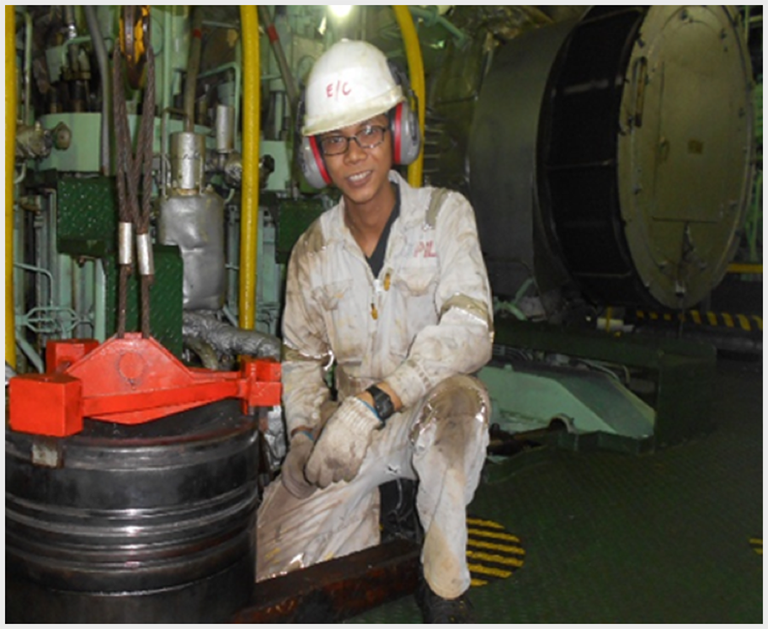 Haziq at work in the engine room
Haziq at work in the engine room
Haziq: I feel a great sense of pride and satisfaction from working with my team to keep the
ship running. How could anything be more fun than to love what you do, and knowing that it
matters? I aspire to be a Second Engineer in charge of the engine room in the next five to ten
years.
Hisyam: My job pays well for the sacrifices and challenges we face, and I feel a sense of
satisfaction with my money being hard-earned. Dealing with crew and officers as well as
shore personnel from different cultures and backgrounds enriches and broadens my world
view. With the opportunity to travel to different places all over the world, from well-developed
countries like the United States and Canada, to developing countries like India and Indonesia,
I realise how fortunate I am to be a Singaporean, as we enjoy world class facilities in security,
education and healthcare. Seafaring is a rewarding career like no other.
I expect to switch to a shorebased job in the next five to ten years. The experience I have
gained while serving on board as well as the qualifications and certificates that I have
attained throughout my career will serve me well when I transit ashore. Many mid to senior
management positions are open to seafarers with qualifications like mine.
With the maritime industry currently undergoing a period of digital transformation, do
you foresee the changes affecting you? How would you prepare yourself?
Haziq: There might come a day when we depend entirely on digital systems, which is
advantageous in allowing us to monitor readings and make adjustments much more
efficiently. An opportunity to learn new digital applications would be of great benefit for me to
stay up-to-date with current developments in the maritime industry.
Hisyam: As an active seafarer, I must constantly enrich myself and keep up with the digital
influx. When I am on shore, I try to attend all relevant courses provided by the various
maritime training institutions such as the Singapore Maritime Academy (SMA) and Wavelink
Maritime Institute (WMI). For example, ships are now going for paperless navigation, which
means large ships are no longer dependant on classic navigation paper charts like in the old
days, making it crucial for us to keep abreast of the latest technology.
Describe the maritime industry in a word/sentence.
Haziq: A Sea of Opportunities.
Hisyam: A challenging, yet interesting and rewarding time awaits those who are willing to
answer the call of the sea.
What do you think are some key qualities to be a seafarer?
Haziq: A sense of humour, discipline and willingness to learn.
Hisyam: Having an open mind to accept and adapt to unfamiliar territories since our job
nature exposes us to different cultures. Having strong familial support goes a long way as
well.
Any advice for those who are looking to join the industry?
Haziq: You must be focused and mentally prepared for a seaman's life. It is more than just
accepting salutes in a white uniform and sunglasses. It is great to work out at sea, but it is a
job that requires hands-on work with serious responsibilities, even for a Junior Officer.
Hisyam: I would advise them to attend Open Houses or approach any of the personnel from
the Singapore Maritime Academy or Wavelink Maritime Institute. These are two excellent
avenues towards a seafaring career in Singapore. There are also resources such as the
Maritime Singapore Connect Office website with more information about the various job roles
in the maritime industry. The key is to take the initiative to find out more if they are suited for
maritime careers.
Just like ships entering the Port of Singapore through various shipping routes, there are many
different directions from which to enter the maritime industry. To find out more about
Maritime Singapore and how you can play a part in this dynamic and growing industry,
explore the Maritime Singapore Connect website now! Are you ready to answer the call of the
sea?

